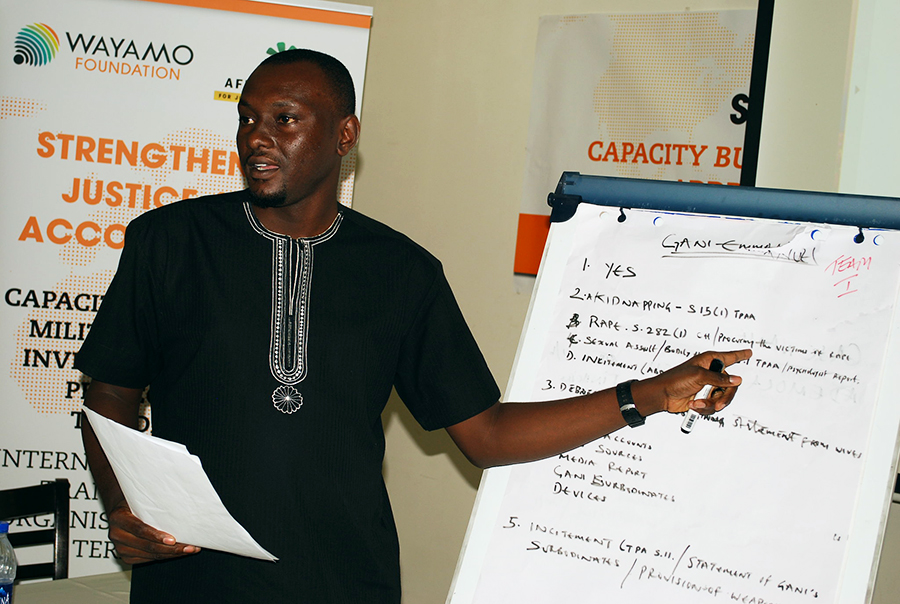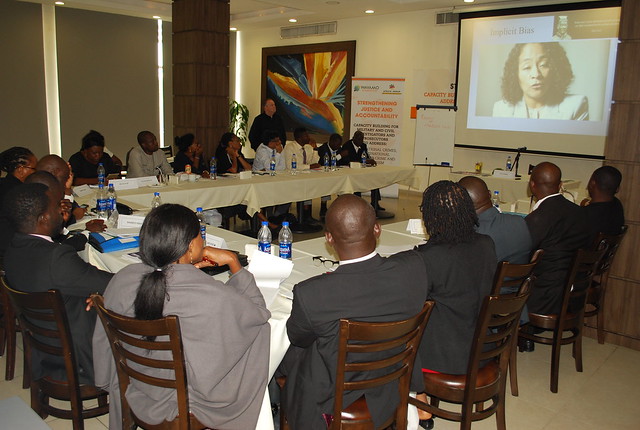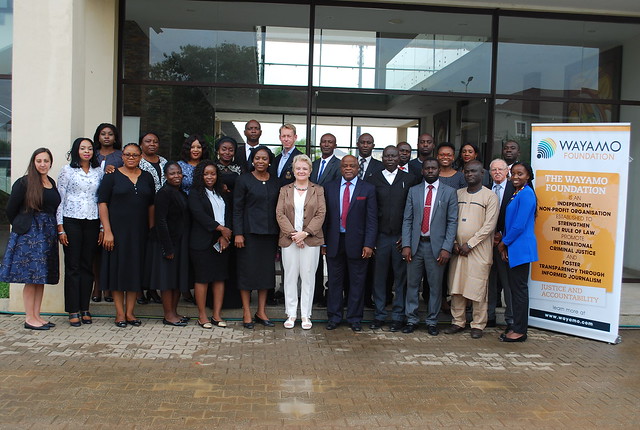Capacity building for civil and military investigators and prosecutors to address the most serious and complex crimes under Nigerian criminal law.
24-26 June 2019, Abuja, Nigeria
With the Abuja rain drumming outside, the Wayamo Foundation and the International Nuremberg Principles Academy, held the seventh of the current series of capacity building workshops on “Strengthening Justice and Accountability in Nigeria” (full programme). The overall aim is to equip Nigerian prosecutors and investigators with the necessary expertise and skills to address the most serious and complex crimes (international, transnational and terrorism-related) under Nigerian criminal law, including crimes that may potentially fall under the jurisdiction of the International Criminal Court (ICC).
The event was officially opened by Wayamo Foundation Director, Bettina Ambach, and Natacha Bracq in her capacity as Senior Officer for Training and Capacity Building at the International Nuremberg Principles Academy. The 20 handpicked civil prosecutors and six investigators from the Department of State Services (DSS), for whom the course was designed, were joined on the third day by a group of military investigators.
The complement of resource persons was made up of mix of experts drawn from Nigeria and beyond, who covered a wide range of topics—legal, psychological and empirical—from both a theoretical and practical standpoint.
Segun Jegede, Special Prosecutor, Federal Republic of Nigeria, and former Prosecutor at the United Nations International Criminal Tribunal for Rwanda (ICTR) spoke on “Synergies between domestic Nigerian criminal law and international criminal law: creative interpretation of domestic law to tackle terrorism and international crimes”, while Lieutenant-Colonel Philip Dygeus, Legal Advisor to Swedish Armed Forces HQ addressed the topic of “Fundamentals of international criminal law, international human rights law and the law of armed conflict: the obligation to investigate alleged violations”. When challenged as to whether a civilian who took up arms to participate directly in hostilities would be a legitimate military target, he confirmed that this would indeed be the case, noting that in the context of a non-international armed conflict “targeting is not status-based but action-based”.
Of keen interest to practitioners were the practical pointers given by former Nigerian Director of Public Prosecutions, Olufemi Fatunde, whose many years of experience, precise command of the facts and sheer charisma made her advice and admonitions on “Effective investigative and prosecutorial techniques (identifying and drafting charges)”, something that no prosecutor could afford to ignore.
When it came to “Case management and advocacy skills, cross-examination of witnesses and the collection of digital evidence”, former UK Prosecutor and Legal Advisor, Rosemary Fernandes, was articulate, dynamic and authoritative, as she variously coaxed and urged her audience to “know your case really well and be a master of the facts”, and to “bear digital evidence in mind as an evidential tool which should be used much more”.
“In every single conflict, sexual violence is used as a tool of war” said UN Expert on the Rule of Law and Sexual Violence in Conflict, Sofia Candeias, as she returned to Nigeria to take on the very difficult and still often ignored subject of “The investigation and prosecution of conflict-related sexual violence”. Rather than go over the legal facts, she chose instead to show a short documentary on how rape had first come to be prosecuted as a war crime at the ICTR, interrupting the film at stages to discuss aspects and pose questions. The point she wished to drive home was that investigators and prosecutors are duty-bound to bring these crimes to light and pursue them.
Claus Molitor, ICC Situation Analyst at the Office of the Prosecutor (OTP) was once again brought in to update the participants on “The ICC’s preliminary examination in Nigeria: understanding the potential cases”. After running through the overall position and reviewing some of the eight potential cases, he reminded the investigators and prosecutors that “as a member of the ICC, Nigeria has committed itself to prosecuting Rome Statute crimes.” Molitor reiterated that it is not enough for a potential perpetrator identified by the ICC to be tried or even convicted domestically of membership of a terrorist organisation, it is essential that such a perpetrator be charged with the specific conduct identified by the ICC.
To bring this home and give the participants an opportunity to apply the knowledge acquired in this and past workshops, Adejoké Babington-Ashaye, international law specialist and former ICC investigator supervised a case scenario in which teams had to analyse a hypothetical situation and come up with a possible charge list. She exhorted them to “think as far outside the box as possible!”
The workshop ended on a fascinating note, with international security consultant and former military interrogator, Mark Fallon, talking on “Strategic investigative interview techniques in compliance with international human rights standards”. Over the course of two, back-to-back sessions covering “Confession-driven versus information-gathering interview practices” and “Deception and eliciting reliable information”, he convincingly exploded the myth that “An innocent person would not confess to a crime he/she did not commit” and left a number of memorable maxims and golden rules for the participants -and the investigators in particular- to mull on: “Interrogation is a process not an event”; “The job is to get information not a confession”; “Education alone will not combat cognitive biases”; and, most of all, “Listen, listen, listen!”
The workshop ended on a high note with an evaluation of the training by the participants and the traditional award of certificates.





